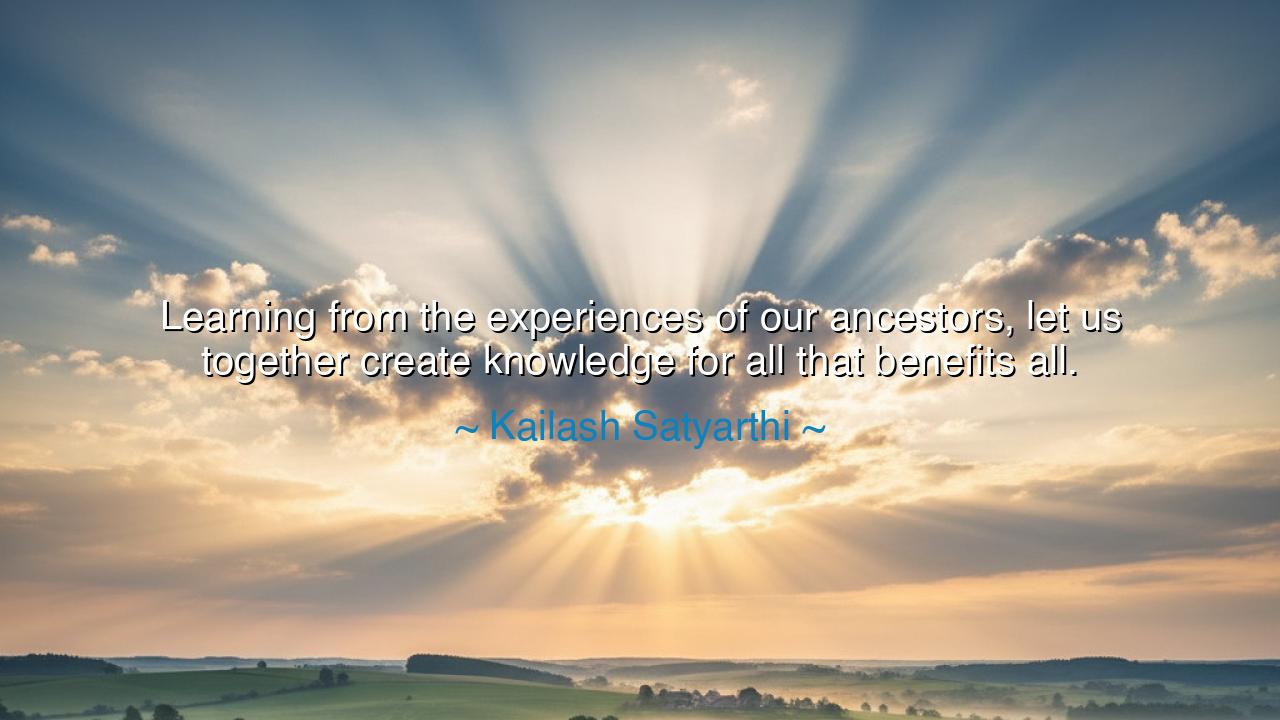
Learning from the experiences of our ancestors, let us together
Learning from the experiences of our ancestors, let us together create knowledge for all that benefits all.






“Learning from the experiences of our ancestors, let us together create knowledge for all that benefits all.” — Kailash Satyarthi
These words, spoken by Kailash Satyarthi, the Nobel Peace laureate and tireless defender of children’s rights, carry the weight of centuries and the light of compassion. They are not merely a call to learn — they are a summons to awaken. In this single sentence, Satyarthi weaves together the wisdom of the past, the cooperation of the present, and the hope of the future. He reminds us that humanity’s greatest strength lies not in division or domination, but in the shared inheritance of knowledge — knowledge born from the triumphs, struggles, and sacrifices of those who came before us.
The origin of these words rests in Satyarthi’s lifelong mission: to free children from bondage, ignorance, and exploitation. In his work, he saw the bitter contrast between the progress of civilization and the suffering of the innocent. He witnessed that while technology advanced, wisdom often lagged behind. Thus, his call was not only for innovation but for ethical wisdom, for knowledge shaped by empathy and guided by moral vision. By urging us to “learn from the experiences of our ancestors,” Satyarthi reaches deep into the soil of human history, reminding us that every generation stands upon the lessons — both glorious and painful — of those who walked before.
The ancients knew this truth well. In the temples of Greece, in the schools of India, in the libraries of Alexandria, teachers and philosophers taught that knowledge without humility is blindness. They understood that learning is not a race to outshine others but a shared pilgrimage toward truth. Satyarthi’s words echo this ancient ideal — that the wisdom of the past must not be worshiped as relic but reborn through cooperation. The phrase “let us together create knowledge” speaks of unity: it is not the knowledge of one nation or one class, but of all humanity. True education, he tells us, is a sacred collaboration — one that breaks barriers of language, wealth, and power, and builds a world where wisdom serves the common good.
Consider the story of the Inca civilization in the Andes. Though they possessed no written language, they passed their wisdom from generation to generation through quipu — cords and knots that held stories, numbers, and truths. Each strand was meaningless alone, but together they formed a tapestry of knowledge. So it is with humanity: the wisdom of one people is a single strand, fragile in isolation, yet mighty when woven together. Satyarthi’s vision is of such a tapestry — a world where knowledge unites rather than divides, where science serves compassion, and where progress uplifts the poor as well as the privileged.
Yet, he also warns us through implication: when we forget the lessons of our ancestors, we walk in peril. History is filled with civilizations that rose in brilliance and fell in arrogance — for they pursued knowledge without conscience. The ancestors he speaks of are not just those of blood, but of spirit — the thinkers, saints, and rebels who sought truth not for power, but for peace. They remind us that wisdom must be earned through reflection, not inherited through pride. The fires of war, the chains of oppression, the wounds of inequality — these are the lessons written in the annals of humankind. To “learn from their experiences” is to vow that such suffering shall not be repeated.
And what, then, does it mean to “create knowledge for all that benefits all”? It means to ensure that education is not the privilege of the few but the birthright of every child. It means that science must serve life, not greed; that innovation must heal, not harm. In Satyarthi’s own life, this principle took form in his relentless fight to rescue children from labor and return them to the light of learning. He believed that the freedom of the child is the freedom of humanity itself — that a mind allowed to learn is a flame that can illuminate the world.
Let this, then, be the lesson passed down to all who hear these words: knowledge is not possession — it is responsibility. We must become both the students and the stewards of wisdom, carrying forward the light kindled by our ancestors. Let us study not only books but hearts; let us build schools not only of stone but of spirit. In every act of teaching, in every effort to understand, we are shaping the destiny of those who will one day call us ancestors.
And so, remember the teaching of Kailash Satyarthi: learn deeply, share freely, and create selflessly. Let the knowledge of the past become the seed of the future. For when we learn together, we rise together; and when knowledge is given in the spirit of love, it becomes more than power — it becomes light for all humankind.






AAdministratorAdministrator
Welcome, honored guests. Please leave a comment, we will respond soon